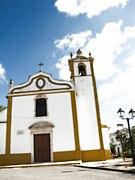world.wikisort.org - Portugal
Sousel (Portuguese pronunciation: [sowˈzɛl] (![]() listen)) is a municipality in the District of Portalegre in Portugal. The population in 2011 was 5,074,[1] in an area of 279.32 km2.[2]
listen)) is a municipality in the District of Portalegre in Portugal. The population in 2011 was 5,074,[1] in an area of 279.32 km2.[2]
Sousel | |
|---|---|
Municipality | |
 Flag  Coat of arms | |
 | |
| Coordinates: 38°57′N 7°40′W | |
| Country | |
| Region | Alentejo |
| Intermunic. comm. | Alto Alentejo |
| District | Portalegre |
| Parishes | 4 |
| Government | |
| • President | Manuel Valério (PS) |
| Area | |
| • Total | 279.32 km2 (107.85 sq mi) |
| Population (2011) | |
| • Total | 5,074 |
| • Density | 18/km2 (47/sq mi) |
| Time zone | UTC±00:00 (WET) |
| • Summer (DST) | UTC+01:00 (WEST) |
| Local holiday | Easter Monday date varies |
| Website | http://www.cm-sousel.pt |
The municipality is famous for its olive trees and as a great hunting region.
The Calça e Pina family was the main developer of Sousel in the 18th century. The economy is mainly based on agriculture, but tourism plays a major role in the region's economy as well.
The present Mayor is Manuel Valério, elected by the Socialist Party. The municipal holiday is Easter Monday.
Parishes
Administratively, the municipality is divided into 4 civil parishes (freguesias):[3]
- Cano
- Casa Branca
- Santo Amaro
- Sousel
Notable people
- Bruno Bolas (born 1996) a Portuguese professional footballer
Gallery
- Local church.
- Distinctive Alentejano chimney.
References
- Instituto Nacional de Estatística
- Áreas das freguesias, concelhos, distritos e país
- Diário da República. "Law nr. 11-A/2013, page 552 117" (pdf) (in Portuguese). Retrieved 31 July 2014.
External links
На других языках
- [en] Sousel
[es] Sousel
Sousel es una villa portuguesa situada en el distrito de Portalegre, región Alentejo y comunidad intermunicipal del Alto Alentejo, con cerca de 2100 habitantes.[ru] Созел
Созел (порт. Sousel; [so(ou)'zɛɫ]) — посёлок городского типа в Португалии, центр одноимённого муниципалитета в составе округа Порталегре . Численность населения — 2,1 тыс. жителей (посёлок), 5,8 тыс. жителей (муниципалитет). Посёлок и муниципалитет входит в экономико-статистический регион Алентежу и субрегион Алентежу Сентрал. По старому административному делению входил в провинцию Алту-Алентежу.Текст в блоке "Читать" взят с сайта "Википедия" и доступен по лицензии Creative Commons Attribution-ShareAlike; в отдельных случаях могут действовать дополнительные условия.
Другой контент может иметь иную лицензию. Перед использованием материалов сайта WikiSort.org внимательно изучите правила лицензирования конкретных элементов наполнения сайта.
Другой контент может иметь иную лицензию. Перед использованием материалов сайта WikiSort.org внимательно изучите правила лицензирования конкретных элементов наполнения сайта.
2019-2025
WikiSort.org - проект по пересортировке и дополнению контента Википедии
WikiSort.org - проект по пересортировке и дополнению контента Википедии

